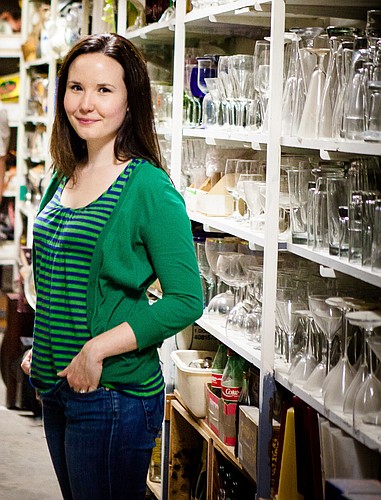- November 23, 2024
-
-
Loading

Loading

How do you tell the story of an unspeakable loss? Lauren Yee’s “In a Word” does exactly that at Urbanite Theatre. Her play tells the story of Fiona and Guy. They adopted a child named Tristan, who’s on the autism spectrum. He’s challenging, but they love him. After he’s kidnapped, his parents are left with a child-shaped hole in their lives. They can’t put their grief into words, though they won’t stop trying. Yee fractures the Aristotelian unities and pushes language to the breaking point to express their sorrow.
It’s a difficult play to direct, both structurally and emotionally. But Chicago-based director Erin Kraft leapt at the chance when the Urbanite team reached out to her. She’s drawn to plays that defy the boundaries of conventional storytelling. Kraft has tackled everything from science fiction (“The Great Inconvenience”), to magical realism (“The Fairytale Lives of Russian Girls”) to meta-fiction (“Circle Mirror Transformation”). She’s no stranger to daring theatrical explorations. But “In a Word” took her even further. She plans to take area audiences with her.
I was drawn to its inventiveness, and Yee’s radically original approach. I loved the way she explores a serious subject without being heavy and dark. I was also deeply impressed by her structural creativity. How do you capture the parents’ grief over an ambiguous loss? She could’ve been embroiled in realism, like other playwrights on this topic. Instead, she evokes their sorrow with the form of the play itself. It’s just brilliant.
Exactly. Fiona and Guy don’t know if Tristan is alive or dead. How do they mourn for him? Should they mourn at all—or just keep hoping and searching? Their options aren’t so neat as the five stages of grief. So, the parents go out of sync with the world; their sense of time is disrupted by the flashbacks and disassociations of PTSD. Yee reflects their fractured reality by jumping around chronologically. She’ll shift from different time frames, sometimes in mid-conversation.
Yes. There’s one scene that superimposes several different realities. It’s dense! You’re forced to decide … When did this happen? Did this really happen? Or is it someone’s distorted recollection? For a director, there’s a ton of decisions. That’s why it’s such a fun project to work on. You know that no two productions could ever be alike.
I think it’s a reflection of the impotence of language in the face of unfathomable sorrow. Fiona has this great line: “… in times like this words fail me. Like they just stop trying. Like whatever they were doing before, they don’t now.” I think everyone’s experienced that in grief.
With the richness of the story itself — and Yee is such a great storyteller! “In a Word” is a family drama and an absurdist comedy, but it’s ultimately a mystery, and that’s what draws people in. The jumps in time slowly reveal all sorts of clues and red herrings. The audience encounters different versions of the day Tristan disappeared. We wind up looking for clues as bigger pieces of the puzzle gradually emerge. We all try to solve the mystery. But we care about the people, not the puzzle. I think that’s the secret.